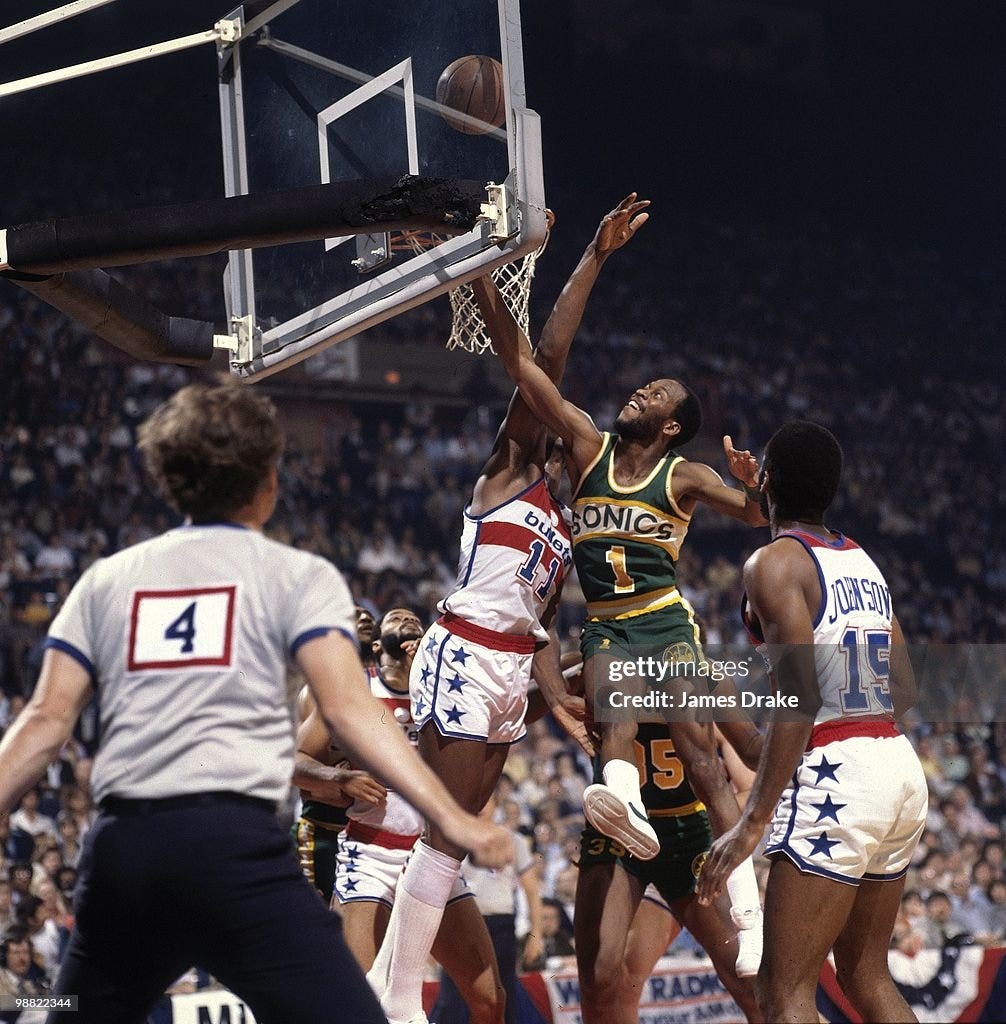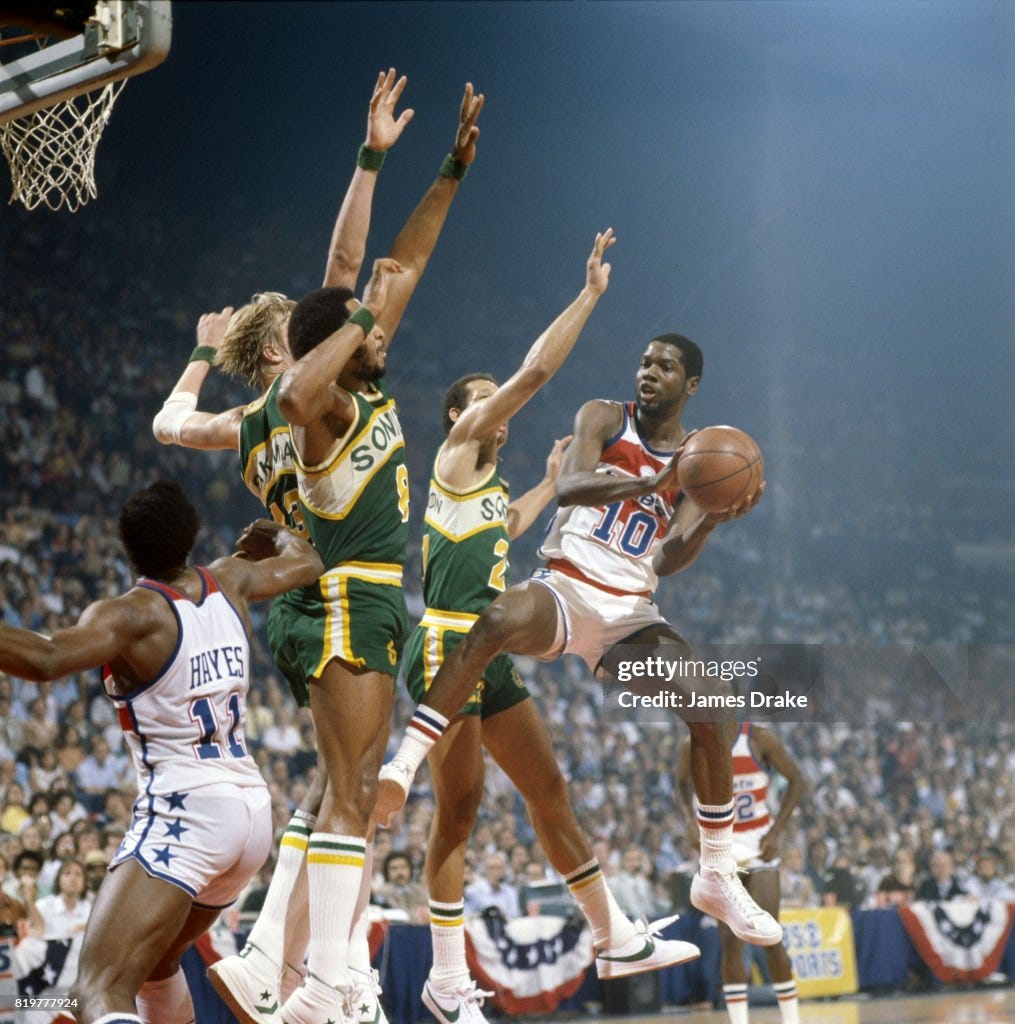A Forgotten Championship Team: The 1979 Seattle Supersonics
A dive into the 1979 Seattle Supersonics, a forgotten team before an era of repeating champions.
In a decade of everchanging champions, Seattle won their first and last championship, kicking off an era of repeating champions between the LA Lakers and Boston Celtics. This team is often forgotten due to their location change to Oklahoma (becoming the OKC Thunder), but also because of the 70s lack of notoriety and recognition in the sport of basketball. Let’s dive into this team and their journey to their one and only NBA title.
The Sonics, coming off a 47-35 record and finals loss to the Washington Bullets, made a few changes to their roster to help aid their next run. Paul Silas, the 36-year-old 2x all-star joined the team for his veteran presence. Lonnie Shelton, the future all-star (1981-82), would join the team after a trade with the Knicks. Joe Hasset would also join the team in free agency. Retaining their core players from the previous year (Dennis Johnson, Jack Sikma, Gus Williams, Fred Brown), they would start the new year under their new head coach, Lenny Wilkens. Wilkens became the coach after Bob Hopkins went 5-17 to start the season and was let go. With this improved roster, they hoped to rejuvenate their finals hopes.
After going 20-6 in the first 26 games, the Sonics would start to slow down a bit, losing 6 straight and ending their pre-all-star break season with a record of 35-15 record. They would eventually finish 52-30 with a 1st place finish in the Western Conference. Johnson would get his first of five All-Star appearances, averaging 16/5/4. Jack Sikma would also get his first all-star appearance, averaging 16/12/3, Gus Williams would lead the Sonics in scoring with 19 ppg.
With a first-round bye, the Sonics would face the Los Angeles Lakers who were fresh off a win against the Denver Nuggets (2-1). The 4x time MVP Kareem Abdul-Jabarr was coming off a series averaging 28/13/5 with 5 blocks and 1 steal. Aided by Adrian Dantley (22/4/1/1) and Jamaal Wilkes (22/10/2/1), the Lakers were a serious threat. Despite Kareem’s 28/12/4, the Lakers would get gentlemen swept (5-1) due to Gus William’s 30/5/2. With an average difference of 6 points, including a 2-point difference in game 4, the Sonic’s defeated the future dynasty.
In the Western Conference Finals, the Sonics faced the Phoenix Suns, who defeated the Kansas City Kings 4-1 the prior series. The Suns, with no 20 ppg scorer the previous series, relied on the 4x all-star, 2-time All-NBA Second Team, Walter Davis (19/4/5 vs. the Kings) and the All-NBA First Team and all-star Paul Westphal (19/2/2 vs. Kings). Gus Williams was again the team's leading scorer, with 22/4/4 a game, just in front of Dennis Johnson’s 20/6/3. In a close 7-game series (1 of 4 the entire playoffs), with a point differential of 7, and a 1-point win in game 6, the Sonic led the Suns to game 7. In game 7, Jack Sikma would drop 33 points, setting a new career high, and closing the series in a 4-point win.
The Sonics advanced to the finals, where they would face their opponent from last year's failure—the Washington Bullets. The Bullets were coming off of 2-7 game series against the Hawks and the Spurs. The year prior, the Sonics took the Bullets to a game 7 series, losing behind Wes Unseld’s 15/9/6 in game 7. The Bullets would take the first game in the rematch with a 99-97 victory, behind the 4x all-star Bob Dandridge’s 23/11/4/4 with the help of 11x all-star Elvin Hayes. The Bullets would come close to winning the series in the next four games, but would ultimately fall short. The Finals MVP Dennis Johnson averaged 22/6/6/2/2 in the series. Johnson notched a near triple-double in game 3 (17/9/9) and had a double-double in game 2 with 32/10/3. Jack Sikma also performed excellently. Averaging 16 points and 15 rebounds, Sikma came up big under the bright lights. Averaging a double-double for the series, Sikma made a strong case for the FMVP.
The year after the Sonic’s finals run and victory, they would run it back with a nearly identical roster. After getting the 3rd seed in the Western Conference they played the Portland Trailblazers (led by all-star Kermit Washington), and won 2-1. In the second round, the Sonic’s played the Milwaukee Bucks (led by Marques Brown) and won the close 7-game series. Seattle then moved on to play the Los Angeles Lakers. Despite Gus Williams’ 24/5/7, and Johnson’s 18/5/3, the newly equipped Lakers would defeat the Sonics behind Kareem’s 30/12/4/2/4 and Magic Johnson’s 17/10/9/3.
After the loss, the roster would change immensely, placing Jack Sikma at the head of the team. Dennis Johnson was traded to Phoenix for Paul Westphal in a one-for-one trade. Westphal was a 4x all-star in Phoenix, averaging 21/2/5. He was a top offensive guard and it begs the question of why the trade was made at all, as Johnson was coming off of an All-NBA second-team appearance, averaging 19/5/4/2/1. Westphal would have his first and last All-Star appearance with Seattle, with only 36 games played, and near career lows across the board, he failed to make the All-NBA first team as he did the year prior. Another major piece in Seattle’s previous championship was Gus Williams. Williams would enter as a restricted free agent after the 79-80 season, but due to contract disputes, he sat out all of the 80-81 season. With Williams not playing and Johnson gone, the team was left on the shoulders of Sikma and Westphal, who couldn’t keep the team afloat. Finishing with a 34-48 record, the Sonics missed the playoffs. With Gus William’s return in the 1981-82 season, the Sonics would go back to their old ways, finishing 52-30, but losing in the Western Conference Semi-finals to the Spurs (4-1). This was their last playoff series win for the next 5 years and started an era of poverty in Seattle.
Thank you for reading my article! If you would like to support me and my content, please consider subscribing or sharing, as it’s free and helps me out greatly. I would greatly like feedback on both my writing and content.







